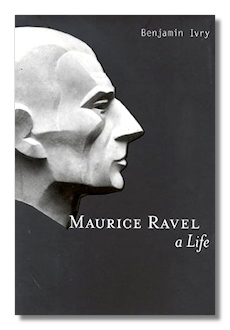
The Internet's Premier Classical Music Source
Related Links
-
Introduction
Acoustics
Ballet
Biographies
Chamber Music
Composers & Composition
Conducting
Criticism & Commentary
Discographies & CD Guides
Fiction
History
Humor
Illustrations & Photos
Instrumental
Lieder
Music Appreciation
Music Education
Music Industry
Music and the Mind
Opera
Orchestration
Reference Works
Scores
Thematic Indices
Theory & Analysis
Vocal Technique
Search Amazon
Recommended Links
Site News
 Book Review
Book Review
Maurice Ravel

A Life
Benjamin Ivry
New York: Welcome Rain Publishers. 2000. 229 pp
ISBN-10: 1566491525
ISBN-13: 978-1566491525
By now, Ravel has likely entered the Pantheon of Permanent Greatness, and yet he hasn't attracted much scholarly or critical work. Debussy is still the hotter ticket. Ravel has written some of the most beautiful scores of the twentieth century – the two piano concerti, the mature violin sonata, Gaspard de la nuit, the string quartet, Introduction et Allegro, Ma mère l' Oye, L' Enfant et les sortilèges, among many others. Like many great composers, he creates a definite, personal artistic space, one that you want to know better. Few writers have said much illuminating about his art.
Ivry, a poet and a translator, can certainly write. He has probably heard everything Ravel ever wrote, more, certainly, than I can say for myself. Clearly, he loves Ravel and he writes about the music with understanding and original insight, despite occasional elementary mistakes on the technical side of music. For example, he points out the importance of Pan to Ravel's artistic makeup, as well the centrality of sorcery and magic in his work. Ivry links the latter to Ravel's Basque mother. He's also especially good both on the meaning of Greece in late-nineteenth, early-twentieth-century France and on Ravel's slightly different take. This, thank goodness, is not a book aimed at specialists, although even a specialist might get something out of it.
However, one finds mental speed bumps throughout. In a life of Ravel, why is there no mention of his baptismal name, Joseph Maurice Ravel? It's a small point, I admit, but the fact that Ivry didn't notice it was missing strikes me as more than a little strange.
Then there's the question of the composer's sexual orientation. As a matter of fact, there's no evidence that he ever had sex. He was discreet to the point where his friends disagreed what his orientation could be. Ivry takes this as repressed homosexuality. I should say I have no dog in this fight. Yet consistently Ivry takes the word of those contemporaries who agree with him and dismisses those who don't without ever offering an argument – indeed, begging the question. Why Ivry dwells so much on this indicates our current notions of the centrality of sexual orientation to a person's life. This is actually a relatively new point of view. To me, Ravel – with his fascination for toys, his dandyism, his self-absorption, his attraction to the world of childhood, exotica, and 18th-century erotica – was essentially a child who never grew up. It seems to me he feared sex, as many children do. Sex certainly bursts forth in much of his work, but that, of course, is dealing with sex at the remove of art. It seems to me far more promising – and even more interesting, in this case – to investigate on the lines of what we actually know. But Ivry is hipped on sexual orientation. He identifies every major homosexual artist in his text, although (again curiously) not the heterosexual ones, like a kid reciting the line-up of his favorite sports team. Consider the following paragraph:
Another salon Ravel attended was hosted by Winnaretta Singer, an American sewing-machine heiress and lesbian who had married the gay Prince Edmond de Polignac. The Princesse de Polignac later commissioned many fine composers, including Stravinsky, Falla, and Milhaud.
Why is this information relevant? If it is relevant, why not rewrite the last sentence to read "including the flamboyantly heterosexual Stravinsky, Falla (closet coprophiliac?), and the boringly-meat-and-potatoes-sexual Milhaud?" It's relevant if you consider sexuality central to the artist, but let's face it: there are more homosexuals in the world than there are homosexual artists who write at the level of Ravel. Ravel's homosexuality (or whatever) doesn't set him apart.
Nevertheless, as an introduction, this isn't a bad job. I would recommend listening to Ravel's music while reading Ivry's descriptions.
Copyright © 2008, Steve Schwartz.


















